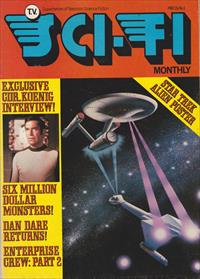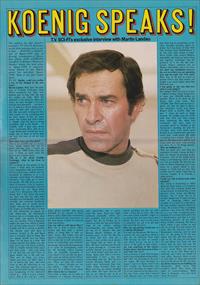Interviews
Koenig Speaks!
TV Sci-Fi's Exclusive Interview with Martin Landau
by Don Andrews
TV Sci-Fi Monthly - No. 6, 1976
Article Source Provided by: Curt Duckworth


The subject for this month's exclusive TV SCI-FI interview needs little introduction to sci-fi fans. MARTIN LANDAU, star of Space: 1999 and, as Koenig, Commander of Moonbase Alpha. DON ANDREWS travelled to Britain's Pinewood Studios where the new series of Space: 1999 is currently being filmed to ask Martin about the new-look Space: 1999. Here is the first instalment...
Martin, could you outline a few of the changes in the new series?
Well, first, the addition of Freddie Freiberger (Star Trek's producer) has been very helpful, just to help with the way the scripts are built. With the addition of the characters Maya and Tony, we have brought a lot more humour and humanity- we have a lot of chance to throw things away and play with each other more. I felt this was sadly lacking the first time around. It was something that we were aware of but for some reason the scripts just didn't allow it. Despite that, the show is doing incredibly well in the States- incredibly well! I have seen about three completed films and six in rough shape and I would say every single one of them is better than our best last year, so we are very pleased.
How many have you shot then?
This is our twelfth out of twenty-four, which means that we are about half-way now. I would say that we are 500 percent better than last year. I think on every level the show is just a better show.
Tell us a bit about Freddie Freiberger, what he has done to change it?
He's worked on the nature of the scripts. I think they are probably more imaginative and more science fiction in just basic content, but the humanity in addition to it is an essential, particularly for American television. You really get to know the people. We talk about our past, there is humour, a lot of humour, and each of us individually is allowed to express his own thing which makes for a divergence. One of the things that I felt about the series last time was that the lines were virtually interchangeable, you could virtually give someone somebody else's lines and it would sound all right, whereas the very nature of the scripts as Freddie sees it is that we talk differently as people do talk differently. An individual's humour lies in a certain area; what may strike one person as funny may not another. Tony's character makes his own beer which is awful and we have jokes about it. It tastes terrible and he is trying to perfect this bloody stuff and there is humour around it. He and Maya have a constant kind of thing. She can change herself into any living shape for an hour at a time. She changes herself into Helena one episode [The Exiles] and I can't tell which is which. This is simple comedy relief, and I kiss them both- they each come to me and kiss me and I have to guess which one is the real one. That sort of thing, you know, which you know we didn't have a lot of before last time. And then there is also the reflecting on our past. The technical aspects are as good if not better, but the stretching and broadening of the characters within is- well it is just a better show, that is all I can say. I mean many shows actually start going downhill in the second or third season, and I think that we learned a great deal from the experience of the first season. I think we learned what was wrong.
Can you tell us a bit about Maya?
Well, she is from a planet called Cyclon [Psychon] and they have a special ability of being able to take on other forms. Her father and the planet is destroyed, and we take her with us, and she is well advanced in terms of technology and scientific knowledge. Her scientific knowledge is so great we immediately make her the scientific officer because they are probably thousands of years ahead of us, and she can generally come up with an answer before the computer does- it always checks out. There are areas she doesn't know, of course, because we run into aliens- other life forms- who may be a million years ahead.
How close is she to a human?
Very close. I mean, she is really an extension of a human. Physiologically, genetically, she is pretty much the same. There are slight variations physically which you have probably seen in the photographs, but she is boning up on culture so that she has some knowledge of our culture, reading encyclopedias and things which she can do in minutes. She and Barbara discuss fashions of the previous years, of the 70s, 80s, 90s on Earth, and they even get a chance to put clothes on at parties and things that we have on the base. We have a library and she will be going through it- I mean they actually discuss "You mean women wore those heels?" and that sort of thing. Again, they have a very nice relationship; I have a very nice relationship with her. But the love interest between Helena and I is much more developed than that which exists between Tony and Maya, and they are always needling each other. She turns into an old hag in one episode just as he is about to kiss her. She can turn into almost anything, but she can only hold a form for an hour. She can turn into a bird, a gorilla, a tiger, or an animal that you have never seen before. We don't use it to the point of absurdity, we use it to aid and abet and help the story.
How are you getting 'round now, is it still the moon base?
It is still the moon base. We have no control over our trajectory which is why we are different from Star Trek, because we have no control over where we go; we are at the mercy of the gods in that respect.
Are you conscious of the science fiction shows that have gone before you, like Star Trek?
I am conscious of Star Trek because when I was doing Mission: Impossible, Star Trek was shooting on stages seven and eight of Desilu which was then bought by Paramount and they were shooting on stages nine and ten of the same lot in the same year. The first three years that I stayed with Mission were the three years Star Trek was in production, so we went through growing pains together. So I am aware of Star Trek only because Gene Roddenberry is an old, very close friend of mine. Bruce Geller, who created Mission: Impossible, and Gene go back a long way together. Freiberger was the producer of it for the last year. Lennie Nimoy replaced me on Mission: Impossible, and I love him.
Are there any similarities between the sets on which you are operating now and the early Star Trek ones?
Well, first of all, just in terms of special effects and that means our budget is so much higher than Star Trek ever was.
I was going to ask you that too. What is your budget?
Our budget? Well this year it is over $7 million, which means that it costs over 300,000 dollars an episode. There is no show in the States that costs more than $250,000. Star Trek took six days to shoot; we take ten days to shoot. Our miniature work- you know, Brian's stuff- is terrific. Also, our sets. I mean we used to laugh because the budget was very little with Star Trek and they would keep repainting the same lots constantly and they used to complain about it. Outside of the Enterprise's standing set and the corridors, they were much more limited as to construction and how much they could spend. We build everything from scratch. This set is just for this show and it will be torn down after this show. This building has been 25 or 30 things already.
They are brilliant sets.
They are great sets, and they are expensive to build. I mean we don't have the luxury of shooting in San Francisco. One of the things about doing a contemporary show is that you can go outside. We did one episode [The Rules of Luton] in which Catherine and I are alone on a planet which is very similar to Earth, and we shot that outside and we spent nine days out on location outside. It is virtually a chase picture.
Could you tell us about some other episodes?
One which is interesting is called Brian the Brain, which is a computer that talks like a human being and moves around. It sounds like a cross between Jerry Lewis and Mickey Rooney, but it turns out to be terribly dangerous. It starts out as a kind of charming object and actually it is a kind of a fun show. We have another episode called The Taybor. He is kind of like a travelling medicine man from the Old West. He is a con man, a magician, and a huckster of a certain kind with a lot of flamboyance, and that is a very interesting episode, all the while being terribly menacing. We have a show where a guy comes on and says he is God, he is the creator. He looks like the character out of a Renaissance painting, and he says that we are going to be his new Adam[s] and Eve[s] and then starts to pair us off. He pairs me and Maya off, and Helena and Tony off, and insists that we mate that way. He creates force fields between us and I can't touch Helena, and then he turns us on so that Maya and I suddenly can't keep our hands off each other. Anyway, there is more of that kind of thing, and episodes where I talk about my life, my past.
So all the characters are building up?
Absolutely. Much more flesh involved, which then makes this kind of counter-balance. When there is jeopardy, you care more about the people.
Space: 1999 copyright ITV Studios Global Entertainment
Thanks to Robert Ruiz